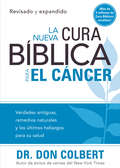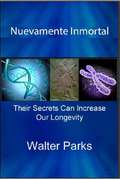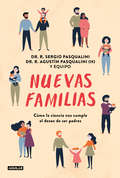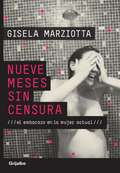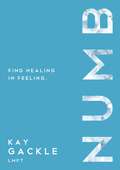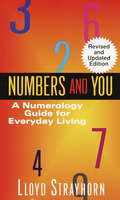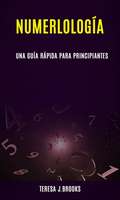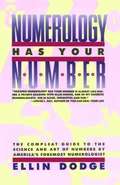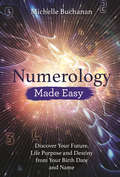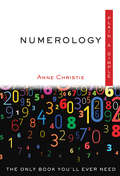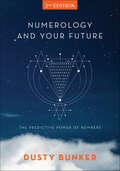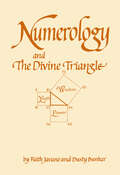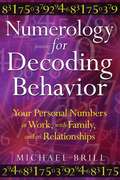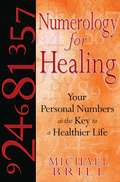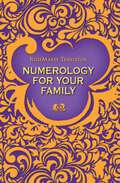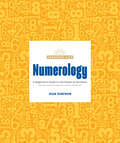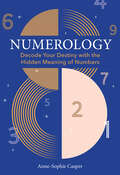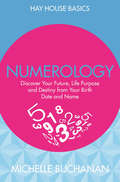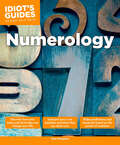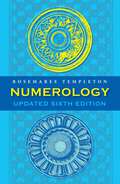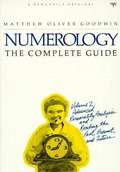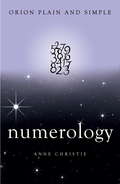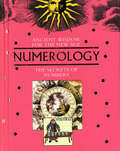- Table View
- List View
Nuestras Recetas Favoritas de Cocción Lenta para Desintoxicar y Perder Peso
by David Arieta Galván Geoff Vicky WellsAmamos las comidas en cocción lenta porque son fáciles, prácticas y sabrosas. Aún mejores son las que ayudan a perder peso y recuperar la salud. Descubrirás que cuando llevas una dieta vegetariana o vegana, estarás comiendo mucho más alimento densamente nutritivo mientras mantienes tus calorías muy bajas. Eso no quiere decir que TODA la comida vegana y vegetariana sea baja en calorías. Aun necesitarás observar tu ingesta de grasas y los alimentos altamente calóricos, pero también descubrirás que conservas la sensación de "estar lleno" por más tiempo porque tu cuerpo está obteniendo más nutrientes de los que necesita. Algunas de las recetas son buenas para desintoxicar y se indican como tales. También todas las recetas son vegetarianas o veganas y la mayoría de ellas te ayudarán a perder peso. Algunos de los postres son un poco altos en calorías así que utilízalos con moderación. Querrás agregar este recetario a tu colección. Aquí está la lista de deliciosas y nutritivas recetas que encontrarás en este libro: Recetas de Desayunos Avena con Manzana y Canela* Budín de Pan para Desayunar* Quinoa y Canela* Desayuno de Avena, Fruta y Nueces* Cereal Caliente Multigrano* Avena con Arándanos en un Noche* Pastel de Pera y Chai para Desayunar** Risotto Especiado para Desayunar* Recetas de Almuerzo/Cena Estofado Cosecha de Otoño* Espinaca Baby y Frijoles Blancos* Frijoles Horneados Vegetarianos/Veganos Básicos Estofado de Frijoles Negros* Sopa Desintoxicante de Brócoli y Coliflor* Sopa de Zapallo y Chirivía* Sopa de Col y Manzana* Guarnición de Col y Manzana* Frijoles Horneados con Maple Canadiense* Curry de Garbanzo con Espinaca y Col Rizada* Estofado de Tubérculos en Trozos* Estofado de Curry y Coco* Frijoles y Vegetales al Curry* Frijoles Pintos Fáciles* Estofado Robusto de Lenteja y Cebada* Cacerola de Frijoles Italian
Nueva cura bíblica para el cáncer: Verdades antiguas, remedios naturales y los últimos hallazgos para su salud
by Don ColbertLa gente hoy en día necesita y desea saber específicamente cómo sentirse y lucir mejor, cómo vivir más tiempo y llevar vidas saludables. En cada libro de la serie La cura bíblica, los lectores encontrarán información médica alternativa junto con verdades bíblicas alentadoras que fortalecen la fe. Presentar las enfermedades y los asuntos de salud comunes en hombres, mujeres y niños es una adición perfecta para el estante.
Nuevamente Inmortal
by Walter ParksLa literatura antigua de la Biblia y las tabletas de arcilla de Sumer nos dice que Matusalén vivió 969 años y que los reyes de Babilonia vivieron aún más. Nuevamente inmortal describe los documentos antiguos y la investigación moderna que pueden permitirnos convertirnos en Nuevamente inmortales.
Nuevas familias: Cómo la ciencia nos cumple el deseo de ser padres
by Dr. R. Sergio Pasqualini Dr. R. Agustín PasqualiniLos doctores Sergio y Agustin Pasqualini, referentes de reconocimiento internacional en Medicina Reproductiva, junto a un equipo interdisciplinario, presentan historias en las que diferentes personas dan cuenta del camino y las decisiones que tomaron a medida que avanzaban en las distintas maneras de concebir un hijo. Durante muchos años consideramos que una familia estaba conformada por una mamá, un papá e hijos. Pero ese modelo ya no es el único. A lo largo de los años, los avances de la ciencia permitieron a diferentes personas concretar su deseo de tener un hijo: mujeres solas, hombres solos, parejas de varones, parejas de mujeres, parejas con problemas de fertilidad, mujeres que ya dejaron de ovular por edad o por una enfermedad preexistente y cualquier persona con alguna dificultad para concebir. También se abrieron puertas que generan debates, como la gestación por sustitución o la adopción de embriones. Los doctores Sergio y Agustin Pasqualini, referentes de reconocimiento internacional en Medicina Reproductiva, junto al equipo interdisciplinario de Halitus Instituto Médico, presentan historias en las que diferentes personas dan cuenta del camino y las decisiones que tomaron a medida que avanzaban en las distintas maneras de concebir un hijo. "Porque en verdad -dicen los autores- este libro se trata de un deseo. Uno solo. Y vital. Es lo que nosotros llamamos deseo procreacional, que es la base, el primer paso, el primer ladrillo, el indispensable para ser mamás y/o ser papás".
Nueve meses sin censura: El embarazo en la mujer actual
by Gisela MarziottaDesde la experiencia personal y con información útil y práctica paracada trimestre de gestación, Marziotta cuenta la verdad sobre elembarazo. Un libro en el que la mujer real de hoy puede sentirseidentificada al fin y verificar que no está tan sola y que hasta puededisfrutar de su nuevo estado. Qué lejos quedaron las mujeres que transitaban la dulce espera en suscasas tejiendo el ajuar de su bebé. La mujer actual trabaja hasta que elcuerpo se lo permite y hasta miente la fecha de parto para no quitarledías a su acotada licencia por maternidad. Mientras la panza le crece ylas hormonas la enloquecen, chequea en Internet cada síntoma, se anotaen yoga, esferodinamia, eutonía, hace casting de obstetras, el médico lareta si engorda, continúa con su vida social, se hace ecografías 4D,intenta no descuidar a su marido -si es que lo tiene-, sigue semana asemana el crecimiento de su bebé con decenas de libros como si todos losembarazos fueran iguales, hace el curso preparto, pide el asiento en eltransporte público, aguanta los baches de las calles, esquiva lasopiniones de todo el mundo, discute sobre qué tipo de parto quiere. Todomientras el sueño, el hambre, el llanto y la risa se apoderan de ella.Así se prepara para el gran día.
Numb: Find Healing In Feeling
by Kay GackleI feel numb.Kay Gackle has heard these words for years as a therapist. Then one day, Kay found she was saying these exact same words.The phrase feeling numb is a bit ironic. Is it a feeling if we "feel" nothing? Being numb can be considered a feeling the same as white is considered a color. The color white appears because it absorbs no color. White is literally the absence of color. In the same way, numb is the absence of feeling. The color white can be seen when it is against a background of other colors. Likewise, we recognize being numb against the knowledge of where other feelings would typically exist. We know that we would naturally feel in a certain way, but we just don't feel anything.In this book, we identify what being numb looks like in everyday life, how we get numb, and the problems and symptoms surrounding it. Not stopping there, we will journey together into a deeper understanding of feelings and begin to let ourselves feel again. Through other’s stories, engaging questions, and practical tools, we can find healing and move beyond being numb.
Numbers and You: A Numerology Guide for Everyday Living
by Lloyd StrayhornIf you can count on your fingers you can use numerology. Learn how to harness the power of numbers with this unique guide, and reveal the secrets of your personality, which lottery numbers you should choose, when is the best time to make decisions, what cities are best for you to live in, how can you tell if someone is right for you, and much, much more.From the Paperback edition.
Numerlología; una guía rápida para principiantes
by Teresa J. BrooksDescubre tu destino con números: detalles cuando una persona comenzó a identificar varias causas, en su comportamiento inmediato, su entorno y su naturaleza de control sobre su temperamento. Es una ciencia cósmica que revela los misterios ocultos de los números. Su origen se remonta a épocas anteriores, cuando una persona comenzó a identificar varias causas, en su comportamiento inmediato, su entorno y su naturaleza de control sobre su temperamento. En este libro, aprenderás: .Qué es la numerología .Los orígenes de la numerología y la rica historia que la rodea. .Por qué funciona la numerología .Una introducción básica a la numerología .Cómo usar tu nombre para descubrir tu destino. .Qué significan los números de raíz para ti. .Qué significa el número que suman tus datos en términos de tu destino También es recomendable mirar tanto el número básico como el horóscopo antes de decidir qué número de nombre vibraría mejor para ti. La numerología en palabras simples se ocupa de la predicción del futuro con la ayuda de los números.
Numerology Made Easy: Discover Your Future, Life Purpose and Destiny from Your Birth Date and Name
by Michelle BuchananAn accessible, authoritative guide to numerology and how it can help you understand yourself and work with the energies each year ahead holds for you.Our date of birth and our name can say a lot about our life's purpose, and even help us make informed decisions for the future. The answers are easy to discover through numerology. Michelle Buchanan began studying numerology 27 years ago after her life was turned around by a reading she received. She now helps others transform their lives through the wisdom of this ancient system. In this book, she explains how numerology can provide insight into who we are, why we are here and where we are going. This book will help readers to:- Uncover their pre-chosen destiny and life purpose- Forecast and plan their future- Discover their strengths, challenges, life lessons, and potential- Choose a suitable career, relationship, and place of residence- Plan important life events such as a marriage, job change, house move or tripThis title was previously published within the Hay House Basics series.
Numerology Plain & Simple: The Only Book You'll Ever Need (Plain & Simple Series)
by Anne ChristieUsing numerology to learn more about yourself and your future doesn't require any psychic ability, mathematical skills, or even any special equipment. The information is based on a series of numbers and by following systems that date back to the Greek mathematician and astrologer Pythagoras and the Hebrew Kabbalah, you'll learn the basics of how to use numbers to explain your life. <P><P>Topics include: <li>Name number <li>Personality number <li>Heart number <li>Destiny number <li>Relationships <li>Short-term forecasts <P><P>Once you master these simple principles, you'll be able to plan your days, predict your future, and even find the most suitable mate. <P><P>This is an accessible and user-friendly guide for people interested in divination systems and personality types. <P><P>“Three is the number of those who do holy work; Two is the number of those who do lover's work; One is the number of those who do perfect evil, or perfect good.”—Clive Barker, Abarat
Numerology and Your Future: The Predictive Power of Numbers
by Dusty BunkerPeople who succeed do so not only because they are determined but because they know when to take action! In this updated, revised, and rewritten 2nd edition, Dusty Bunker will help you predict your future and identify trends around the world through personal cycles and numbers. Find out the importance of timing and how you can use number cycles to plan what’s ahead and prosper in unbelievable ways. In a stroke of divine comparison, you’ll find the accuracy of the predictions Dusty made in 1979 for the 1980 decade. She then discusses the events of the following three decades: 1990s, 2000s, 2010s. In addition, she reveals the trends for the 2020s—what she calls “A Decade of Privacy due to Burnout: Ransomware, the Internet, Social Media, Deepfake, Facebook, Politics, Robocalls, and Sex.” And . . . for the first time, she unveils a repeating cycle that will occur in the 2020 decade that suggests three major world-shifting events. In this perfect companion to her major work Numerology and the Divine Triangle, take a revealing and uplifting journey of personal discovery to spiritual awareness. You’ll find that timing is the key to success in love, money, fame, and happiness!
Numerology and the Divine Triangle
by Dusty Bunker Faith JavaneNumerology and the Divine Triangle is a seminal and all-encompassing text that presents a complete introduction to the esoteric field of numerology. This authoritative work is divided into two parts, each with its own unique offerings. Part I serves as a comprehensive introduction to the subject, providing readers with a thorough foundation in the principles of numerology. Part II features extensive delineations of each of the numbers from 1 to 78. What sets this book apart is its pioneering approach to synthesizing numerology, astrology, and Tarot symbolism, presented here for the first time in book form. Each number is explained in terms of its personal number vibrations temporary number vibrations astrological correspondences Tarot symbolism, with each of the Tarot cards illustrated to aid comprehension. Numerology and the Divine Triangle is a groundbreaking work that will set the standard for all future books on the subject. Its comprehensive and insightful content, coupled with its innovative approach, make it an essential resource for anyone seeking a deeper understanding of numerology, Tarot, and astrology.
Numerology for Decoding Behavior: Your Personal Numbers at Work, with Family, and in Relationships
by Michael BrillUsing numerology to reveal behavior patterns in order to work through them • Shows how to find anyone’s personal challenges and greatest strengths • Presents simple numeric exercises that use the first vowel and first consonant of a name and the birth month and day • Reveals how this method of numerology can be applied by managers, educators, health professionals, sales people, and parents Numbers and letters are the blueprints of our lives. By studying the patterns they create--whether it’s a name, an address, or a date--we can learn more about ourselves, others, and how to best interact with those around us. Providing simple numeric exercises that use only the first vowel and first consonant of a person’s name and their birth month and day, Michael Brill shows how to identify anyone’s reactive and proactive behavior patterns--along with their underlying causes--to prevent and resolve interpersonal issues as well as recognize and change our own negative personal tendencies. Combining numerology with psychology, he explains the connection between the first name and behavior at work, the middle name and social-emotional patterns in relationships, and the last name and family dynamics. Illustrating how this information can be applied by managers, educators, health professionals, sales people, and parents, he reveals how to find anyone’s personal challenges and greatest strengths through their Achievement Number as well as how to use this number for a more accurate understanding of an individual’s behavior patterns. Offering extensive examples, interpretations, and exercises, he reveals how recognizing these facets of our behavior is the first step to working through our negative patterns and effecting personal transformation.
Numerology for Healing: Your Personal Numbers as the Key to a Healthier Life
by Michael BrillA unique approach to using numerology to identify life challenges and karmic lessons to heal emotional and physical problems• Provides a clear method for identifying challenges specific to your birthday and name• Details 185 health conditions and how to address the causes using numerology--from addictions and Alzheimer’s disease to thyroid problems, heart failure, and cancer• Offers guidance in understanding universal abandonment issues and how these affect our behaviorIn Numerology for Healing, Michael Brill combines numerology with psychology, quantum physics, and the concepts of gematria and reincarnation to create a unique approach to healing emotional and physical problems based on life challenges and karmic lessons. Humans suffer from a profound sense of abandonment when the soul is decanted from the Universal Oneness into the confines of a personality. Brill explains how this sense of abandonment manifests itself in two principal types of behavior: people work to be loved and appreciated for who they are, or they try to control and micromanage their lives and relationships so that nothing goes wrong. Both of these behavior patterns are exhausting physically, emotionally, and mentally and are clear catalysts for illness.Brill details 185 physical and mental health conditions and shows how to identify and treat the causes--from addictions and Alzheimer’s disease to thyroid problems, heart failure, and cancer. For instance, he reveals that, in general, illnesses beginning with the letter “A” (acne and alcoholism) have issues of self-esteem as one of the basic causes, whereas illnesses beginning with letter “G” (gallstones and glaucoma) are associated with a need to be in control, in relationships or at work. By using the numerology of your birth date and name, Numerology for Healing makes it easy to identify your positive and negative tendencies and characteristics and to use them as the key to achieving a healthier life.
Numerology for Your Family
by RoseMaree TempletonBeautiful to behold and sacred throughout time, flowers hold powerful nature magick, entwined with the rhythms of the Earth. Work with flowers to create your own powerful and divine spells for the change, support and inspiration you seek in life, love and happiness. Along with 60 sacred flower spells from Cheralyn Darcey&’s personal nature grimoire, The Book of Flower Spells includes spellcasting and spellcrafting basics, information on magickal gardening and supply sourcing and includes dedicated lessons on how to write and cast your own spells. To complete your treasury of flower nature magick, a beautifully illustrated personal grimoire journal section is provided to keep your own bespoke flower spells.
Numerology: A Beginner's Guide to the Power of Numbers
by Jean SimpsonWidespread interest in numerology never seems to wane, but there are still plenty of people who want to know how to use numbers to learn more about themselves and to make predictions for the future. Idiot's Guides: Numerology is an easy-to-understand reference that explains Chaldean, Pythagorean, Kabbalah, Chinese, and other systems. It offers step-by-step instructions for calculating and interpreting the various types of numbers, including the Destiny, Soul, Personality, and Life Path numbers, as well Pinnacles and Challenges. Idiot's Guides: Numerology also includes a succinct, but detailed, worksheet for calculating and capturing all of the various personal numbers.
Numerology: A Guide to Decoding Your Destiny with the Hidden Meaning of Numbers
by Anne-Sophie CasperUsing only a name and date of birth, Anne-Sophie Casper&’s Numerology teaches how to use the art of numerology for self-understanding. Using an original approach that takes the two sides of the brain into consideration, Numerology incorporates methods of both logic and intuition, and then mixes theory and practice through calculations and tests. What are hereditary, expression, and spiritual numbers? How can one find their simple and master numbers and then use them to determine their key elemental energies? This introductory guide breaks down basic information and background on numerology, but then shares the tools necessary to understand different personalities, worlds, and people in greater detail.
Numerology: Discover Your Future, Life Purpose and Destiny from Your Birth Date and Name
by Michelle BuchananDiscover what your date of birth and your name say about your life purpose, and how they can help you make informed decisions about your life.Michelle Buchanan began studying numerology 27 years ago after her life was turned around by a reading she received. She now helps others transform their lives through the wisdom of this ancient system. In this book, she explains how numerology can provide insight into who you are, why you're here and where you're going. This book will teach you how to calculate your numbers and how they can help you to:- Uncover your pre-chosen destiny and life purpose- Forecast and plan your future- Discover your strengths, challenges, life lessons and potential- Choose a suitable career, relationship and place of residence- Plan important life events such as a marriage, job change, house move or trip
Numerology: Make Predictions and Decisions Based on the Power of Numbers (Idiot's Guides)
by Jean SimpsonWidespread interest in numerology never seems to wane, but there are still plenty of people who want to know how to use numbers to learn more about themselves and to make predictions for the future. Idiot's Guides: Numerology is an easy-to-understand reference that explains Chaldean, Pythagorean, Kabbalah, Chinese, and other systems. It offers step-by-step instructions for calculating and interpreting the various types of numbers, including the Destiny, Soul, Personality, and Life Path numbers, as well Pinnacles and Challenges. Idiot's Guides: Numerology also includes a succinct, but detailed, worksheet for calculating and capturing all of the various personal numbers.
Numerology: Numbers and Their Influence
by RoseMaree TempletonThe Art of Witch moves beyond bells, whistles, tools and potions, and enters a new era of spiritual mastery for the modern age. Fiona Horne bypasses the old-school rules and traditions and shows you how to learn and grow with the times. This is the guide for the structure-less, and rule book for the revolutionaries. New ways are embraced with the old; what it really means to be a modern Witch is revealed; how to practise authentic Witchcraft now to live a deeply fulfilled life is explained. The Art of Witch is a manifesto – a code of ethics and principles – partnered with revealing real-life anecdotes explaining how to anchor the magickal theory in everyday life. Live your most magickal life Master the art of true transformation Perfect the craft of Witches&’ resilience Know the Witch you are Trust the magick inside you. 'So on the pulse point of modern witchcraft that it is frightening' Tonya Brown – Editor, Witch Way Magazine.
Numerology: The Complete Guide, Volume 1
by Matthew O. GoodwinThis book describes how you can use the numbers in your name, birthdate and other things to analyze your personality and give you personal insights.
Numerology: The Key To Your Inner Self
by Hans Decoz Tom MonteA guide to numerology and how to learn about your numbers and how to study the numbers of others.
Numerology: The Only Book You'll Ever Need (Plain And Simple Ser.)
by Anne ChristieUsing numerology to learn more about yourself and your future doesn’t require any psychic ability, mathematical skills, or even any special equipment. The information is based on a series of numbers and by following systems that date back to the Greek mathematician and astrologer Pythagoras and the Hebrew Kabbalah, you’ll learn the basics of how to use numbers to explain your life.
Numerology: The Secret of Numbers (Ancient Wisdom for the New Age)
by Greg RussellThis introductory guide to the mystical power and meaning of numbers show you how to unlock the secrets of your name, birth date, and more. Numerology is an ancient practice that reveals the hidden power, meaning, and wisdom of numbers and offers guidance in our daily lives. Delving into the significance of the numbers from one to nine, this book explains how to use numerology to discover more about yourself, your relationships, and your career possibilities. It also demonstrates how numerology relates to other ancient systems, including tarot, I Ching, and both western and eastern astrology. Here you will learn how to derive significant numbers from your birth date and name. These numbers provide insight into your psychic attributes, destiny, and even sexual attraction and marriageability. Each number is covered in detail, including how it affects one&’s interests and desires.

